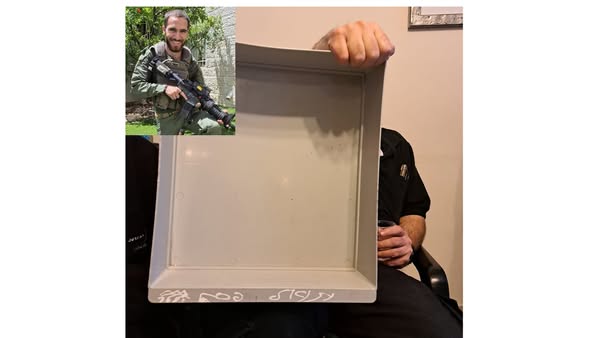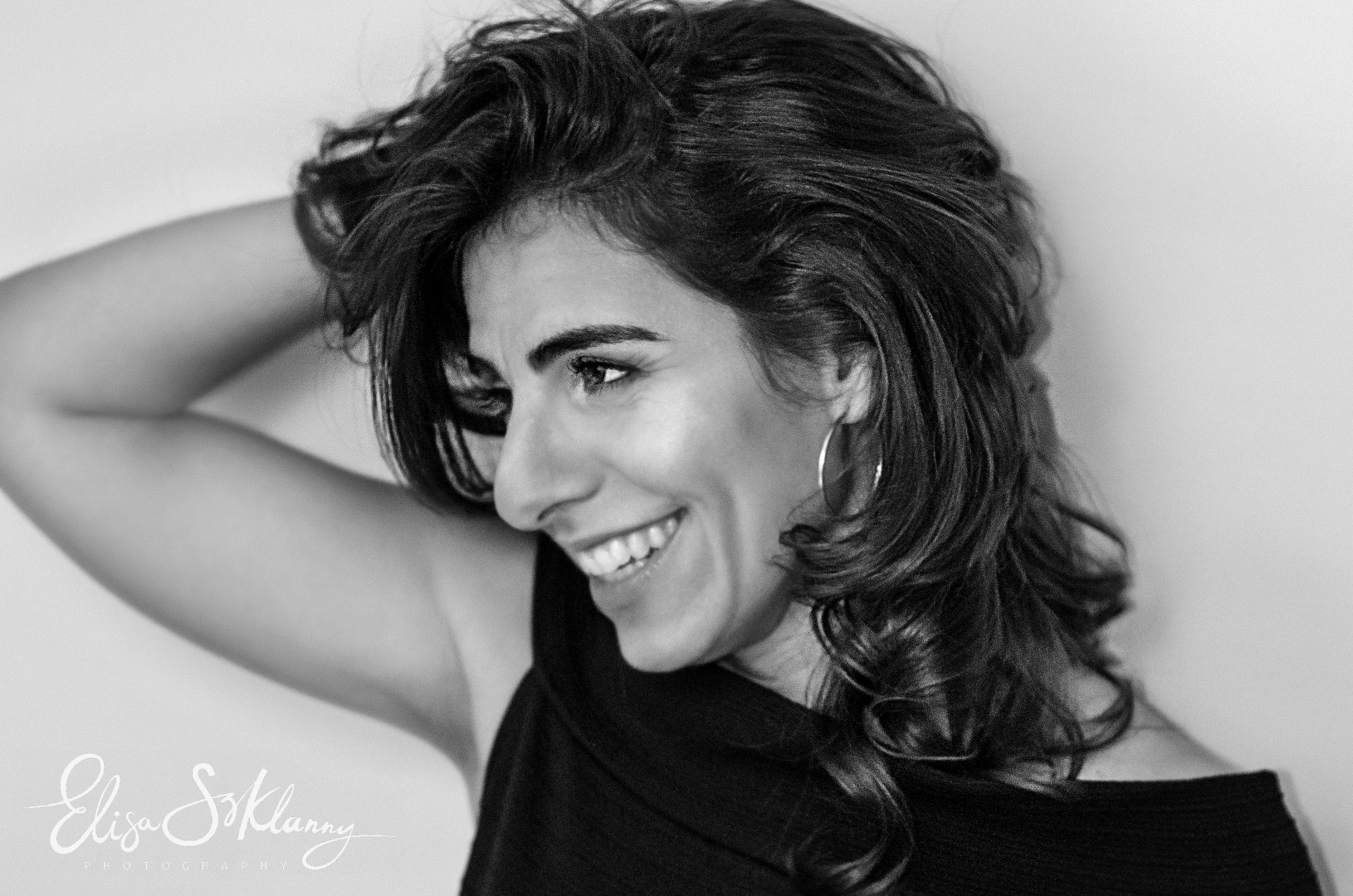Shiva in the Pessach home is unique. Visitors stream in and out, and a special warmth exudes throughout the house. Behind me, an enlarged happy family photo takes up a large section of a wall. Along the same wall stands a small table displaying the photo of Netanel, also enlarged, that has been circulating the media. Certificates from the army for excellence and course completion are propped up against it.
The kitchen is abuzz. The community of Elazar has organized shifts so that there is constant activity in the kitchen, from morning till evening. People serve lunch to the mourners as they sit with the visitors; there are trays of drinks, cut-up fruit, nuts, and biscuits being offered to all. Kind words are offered as they dote on the mourners. I am taken aback by the deep, sincere, and loving support for the family. I’ve seen devoted support before, but this is exceptional. “We’re used to it,” says Elad. Netanel is the eighth child of the community to have been killed since October 7th. Seven were soldiers and one was at the Nova Festival.
A woman walks into the house holding what looks like a white box.
“Ah! The famous drawer!” Elad exclaims, and we hear the story:
The woman with the drawer was a schoolteacher of Netanel. The day he fell, she happened to come across the drawer at school where he had kept some of his personal items – seven years previously. On the day he fell. He had scrawled his name along an inside surface, and it remains as white as it was all those years ago.
Beyond that, as soon as the community heard the heartbreaking news, Netanel’s eighth grade Hebrew teacher (not the one who brought the drawer) began looking through her old files for his schoolwork. The only piece of work she was able to find was a single essay. The only piece of work. The teacher at the shiva house has brought a printed copy of the essay as well.
“Read it,” she says. “You’ll get chills.”
[And check out the dates at the end]
BS”D
21 Kislev, 5776 [2015-16]
A Hero’s Monologue: Ze’ev Jabotinsky
By Netanel Pessach
“I admit that there are moments in which I dream of an Arab-Jewish agreement regarding the Land of Israel, but as long as there remains a solitary spark of hope that they will be able to prevent the transformation of “Palestine” into the “Land of Israel,” there are no such pleasant words in the world, and no attractive promises that would have the Arabs give up their hope – precisely because they are not a disorderly horde, but a living nation.
“There can be no voluntary agreement between us and the Palestine Arabs. Not now, nor in the prospective future. I say this with such conviction, not because I want to hurt the moderate Zionists. I do not believe that they will be hurt. Except for those who were born blind, they realised long ago that it is utterly impossible to obtain the voluntary consent of the Palestine Arabs for converting “Palestine” from an Arab country into a country with a Jewish majority.”
These are the words that I write in my 1923 essay, “Iron Wall.”
I was born in Odessa, which is in southern Ukraine, on 18 October, 1880. My mother is descended from the Maggid of Dubno and my father was a merchant. When I was six years old, my father passed away. My family faced difficult times, but with my mother’s education and independent mindset, she managed the family well. At age seven, I began studying at the gymnasium. I enjoyed poetry, literature, and learning languages. When I was 17, I made my way to Switzerland. While journeying through Hungary, I encountered the distressing conditions in the Jewish ghettos. In early April of 1903, on the Festival of Passover, the Kishinev pogroms broke out, which led me to establishing connections with people involved in Zionist activity.
In 1933, with the rise of Hitler in Germany, I watched as the Holocaust encroached the Jews of Europe, and I appealed to everyone to leave the lands of our exile in a swift and orderly fashion, and to come to the Land of Israel. My words were that if the Jews won’t eliminate the Diaspora, the Diaspora will eliminate the Jews. I advocate for political Zionism, a renewal of national pride, and developing a Jewish military, alongside social-liberal values, and respect for people’s dignity, wherever they may be.
I was a founder of the Jewish Self Defense Organisation in Odessa; I co-founded the Jewish Legion with Joseph Trumpeldor during the First World War. Likewise, I established the Irgun in Jerusalem as a reaction to uprisings against the Jews, and I was the senior commander in Etzel. As a result of my activities, the British arrested me. I was exiled from the Land of Israel and forbidden to ever return.
In my vision, I see a sovereign state that will guarantee the continuation of the existence of the Jewish people. I believe in the creation of the appropriate political conditions as a prerequisite for settlement activity, and I reject the practice of immigrant selection for the purposes of preserving a specific character of society in the Land of Israel. The Jewish state has a special purpose that seems to have been reserved for it since the Six Days of Creation. The final, true purpose of the Jewish state is to create a national culture that will be lauded all over the world. A Jewish military force is necessary to protect the Jews of the Diaspora and the state that is to be established. I see the organization of a Jewish self-defense as an expression of national pride and self-respect, that will arouse the downtrodden and humiliated Jewish masses and inspire in them self-trust and self-confidence. I see a society founded on solidarity and social values, and it is the duty of the state to outline, ensure, and provide its basic needs. I see the use of Hebrew as the ultimate goal in education. I believe that every delegate in the Zionist Congress has to know Hebrew as its official language, with Hebrew being the general language of instruction in every school. National values cannot be taught using foreign tools. Only by instilling national concepts will we be able to penetrate Hebrew consciousness into Jewish hearts. I know that most Jewish leaders refer to me as the owner of a wild imagination, and I remain alone in that stance.
Despite this, I am prepared to fight for my vision to the very last moment.
Submitted by Netanel Pessach ח’4
Netanel Pessach’s essay is dated 21 Kislev.
The date he fell – 22 Kislev.
I have been sitting in the Pessach’s living room for one and a half hours. It is still light outside, but dusk is threatening to infuse the day’s end with its haze. It will soon be time to light the chanukiah. I stand up to leave, examining the photograph on the wall and Netanel’s army certificates on my way out.
I unlock my car and begin the drive home. I think how the time I chose to visit the family was the same time I merited to hear the stories of the drawer and the essay, how they made their appearance during those same 90 minutes. I think of the corresponding dates.
I am no longer surprised by the synchronicities of life.
It is as it should be.


